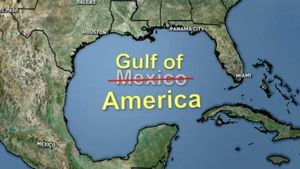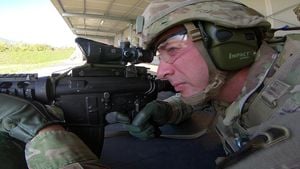Pope Francis is facing serious health challenges as he remains hospitalized at Rome's Gemelli Hospital for double pneumonia, marking one of the most significant crises of his papacy. The Vatican has reported the 88-year-old pontiff continues to be critically ill, with recent updates indicating he is receiving high-flow oxygen after suffering from respiratory crises.
Admitted to the hospital on February 14, Francis showed early symptoms of pneumonia, which have since worsened, resulting in complications such as thrombocytopenia linked to anemia. This unfortunate turn of events is the latest chapter of health issues for the Pope, who underwent part of his lung removed during his youth. The current circumstances have raised concerns about his ability to perform his papal duties, prompting discussions among cardinals about the potential for leadership change.
According to the Vatican Press Office, "The Holy Father's condition remains critically so, as explained yesterday, the Pope is not out of danger." This comment reflects the gravity of the situation, where even minor updates are closely monitored by the public and Catholics worldwide. Described as experiencing prolonged asthma-like respiratory crises, the Pope’s condition necessitated the administration of blood transfusions—a sign of how dire his health has become.
On Sunday morning, there was some news of respite, as the Vatican released word about Francis having had a "tranquil" night and being able to rest. Despite these brief moments of stability, the reports consistently echo the gravity of his health. "His prognosis remains reserved," stated the official reports, indicating the extent of the concern among medical teams.
Many Catholics across the world are deeply invested, engaging in prayer vigils for the Pope's recovery. Outside Gemelli Hospital, there have been gatherings of believers lighting candles and leaving flowers as they plead for his health. "Let’s hope he can keep living," expressed pilgrim Matteo Licari, illustrating the anxious feelings among the faithful.
Political figures have also weighed in; Italian Prime Minister Giorgia Meloni visited the Pope and noted, "I am very happy to have found him alert and responsive," underscoring the delicate balance between hope and worry. This visit took place amid growing fears concerning the Pope's ability to continue leading the Catholic Church due to the severity of his health issues.
Previous health complications have subjected Pope Francis to hospitalization multiple times during his papacy. Episodes of respiratory trouble and intestinal surgeries have challenged his tenure. The current bout, affecting both lungs, has raised alarms not only among his health practitioners but also within the Vatican as discussions about potential succession have emerged.
The international community remains eager for updates on Pope Francis’s health, as these developments are not merely personal; they have vast ramifications for the Church's direction. His condition raises pressing questions about the operational continuity of the Catholic Church and the future leadership, should his health deteriorate.
Efforts to address this tumultuous situation reflect on the Pope's significant role and the affection held for him globally. With scheduled masses across different dioceses focusing on prayer for Francis, communities are sending their collective energy toward his recovery. Archbishop Rino Fisichella called upon worshippers for stronger prayers, stating it's time to make them "more intense" for their beloved pontiff.
Pope Francis has, throughout his papacy, often advocated for hope and resilience during difficult times. Now, as he faces his greatest medical challenge, both he and the faithful await developments on his health with bated breath. The coming hours and days are pivotal, with anticipation hanging over updates from the Vatican as the world now converges to pray and ponder their Pope's future.



